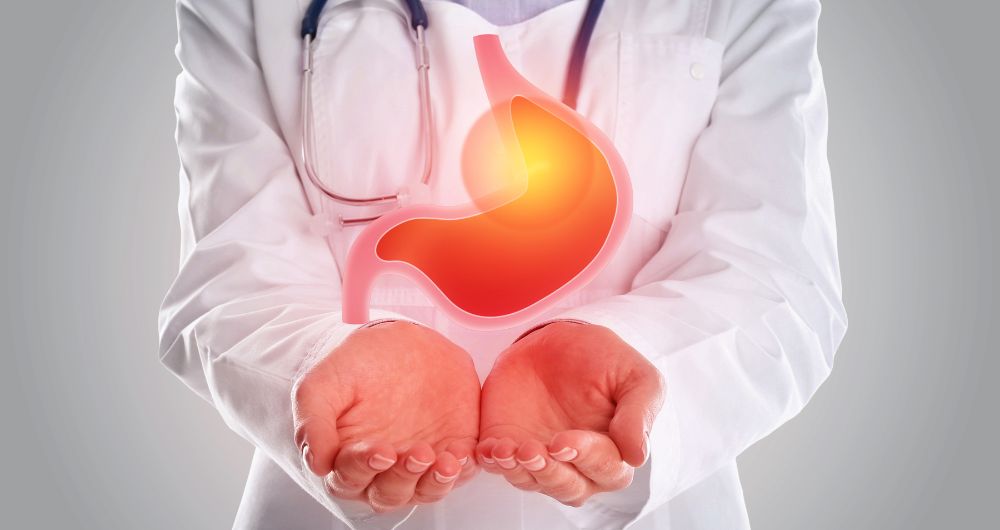
Heartburn is a common and often uncomfortable ailment affecting many residents of Bridgeport, CT. While it may seem minor, persistent heartburn can lead to more severe complications if left untreated. Consulting a primary care doctor in Bridgeport is crucial in managing heartburn effectively. This thorough guide will cover the root causes of heartburn, selecting the appropriate primary care doctor in Bridgeport, CT, and the key inquiries to pose during your appointment. Let’s embark on a journey to ensure your heartburn concerns are addressed by a trusted heartburn doctor.
Heartburn, also known as acid indigestion, is a burning sensation in the chest that occurs when stomach acid rises into the esophagus. This sensation is often mistaken for a heart-related issue due to its location and intensity. It’s important to differentiate heartburn from other conditions; consulting a primary care doctor in Bridgeport, CT, becomes vital.
The LES prevents stomach acid and digestive juices from refluxing into the esophagus. When it weakens or relaxes inappropriately, these acidic substances can flow upward, resulting in heartburn symptoms.
Excess body weight, especially around the abdomen, can exert pressure on the stomach, forcing acid into the esophagus. Obesity is a significant risk factor for heartburn.
Smoking can weaken the LES and reduce saliva production, which normally helps neutralize stomach acid. Smokers are at a higher risk of experiencing heartburn.
Hormonal changes and increased abdominal pressure during pregnancy can lead to heartburn. Many pregnant individuals experience heartburn, especially in the later stages of pregnancy.
Certain medications, such as non-steroidal anti-inflammatory drugs (NSAIDs), calcium channel blockers, and sedatives, can relax the LES or irritate the esophagus, increasing the risk of heartburn.
Consuming large meals, eating too quickly, or lying down immediately after eating can promote acid reflux and trigger heartburn symptoms.
GERD is a chronic condition where frequent stomach acid reflux into the esophagus leads to persistent and severe symptoms. While heartburn is a common symptom of GERD, individuals with GERD often experience it more frequently and intensely. Other symptoms may include regurgitation, chest pain, difficulty swallowing, and chronic cough. Diagnosing GERD may require specialized testing, and its management typically involves medications and lifestyle modifications.
A hiatal hernia occurs when a portion of the stomach protrudes through the diaphragm into the chest cavity. This structural abnormality can lead to heartburn by weakening the lower esophageal sphincter (LES), the muscular ring that separates the stomach and esophagus. While hiatal hernias can cause discomfort and heartburn, they are usually manageable through medication and lifestyle changes.
Esophageal strictures are narrowings or constrictions in the esophagus, often resulting from long-term acid reflux. They can cause difficulty swallowing and may be accompanied by heartburn. Treatment typically involves addressing the underlying cause, such as GERD and may include procedures to dilate or widen the esophagus.
Barrett’s esophagus is a condition where the tissue lining the esophagus changes, potentially increasing the risk of esophageal cancer. While it may not produce noticeable symptoms, individuals with Barrett’s esophagus may have a history of chronic heartburn. Regular monitoring and management are essential to reduce the risk of complications.
Heartburn can sometimes be mistaken for cardiac issues, particularly angina or heart attack. The chest pain associated with these conditions can mimic heartburn. It is crucial to differentiate between the two, as cardiac issues require immediate medical attention. Symptoms that may suggest a cardiac problem include pain radiating to the left arm, shortness of breath, and sweating.

Seeking guidance from a heartburn doctor is crucial in effectively managing heartburn. These medical professionals serve as your primary point of contact for comprehensive healthcare and play a pivotal role in diagnosing, treating, and preventing heartburn. Establishing a long-term relationship with a primary care doctor in Bridgeport, CT, offers many benefits, ensuring consistent and personalized care for your heartburn condition.
Your doctor for heartburn is your healthcare partner, offering expertise in various medical fields, including internal medicine. When it comes to heartburn, their role is multifaceted:
They will thoroughly evaluate the cause and severity of your heartburn symptoms, determining whether further tests or specialized care are necessary.
Primary care doctors are well-equipped to provide initial treatment for heartburn, such as prescribing medications or recommending lifestyle modifications.
They offer guidance on preventive measures to minimize the frequency and intensity of heartburn episodes.
If your condition requires specialist care, your heartburn doctor can coordinate referrals to gastroenterologists or other relevant specialists, ensuring seamless healthcare.
Opting for local care in Bridgeport, CT, when managing chronic conditions like heartburn comes with numerous advantages:
Local primary care doctors are easily accessible, allowing you to seek healthcare services promptly. This is especially crucial in managing heartburn symptoms, as timely care can alleviate discomfort and prevent complications.
Doctors in the local area are often familiar with environmental factors, dietary preferences, and lifestyle patterns specific to Bridgeport, CT. This familiarity enables them to provide more tailored recommendations and treatments.
Building a long-term relationship with a local doctor for heartburn fosters trust and continuity of care. They get to know you and your medical history, ensuring that your heartburn management plan is personalized and evolves as your needs change.
Local primary care doctors often have relationships with nearby healthcare facilities like DOCS Medical Group, specialists, and support networks. This can expedite referrals and access to additional resources for comprehensive heartburn care if required.
Local care minimizes travel time and logistical challenges, making attending regular follow-ups and adhering to treatment plans more convenient. This convenience is especially valuable when managing a chronic condition like heartburn, which may require ongoing care.

When visiting your primary care doctor in Bridgeport, CT, you must ask the right questions to understand your heartburn and how to manage it effectively.
When discussing your heartburn symptoms with your primary care doctor, you’ll want to inquire about the various factors contributing to your discomfort. Your doctor will conduct a thorough evaluation to determine whether your heartburn is related to dietary choices, lifestyle habits, or underlying medical conditions. By identifying these contributing factors, you can work with your doctor for heartburn to develop a more effective treatment and management plan.
In addition to understanding the immediate causes of heartburn, exploring the possibility of underlying medical conditions is crucial. Heartburn can sometimes be a symptom of more serious issues such as Gastroesophageal Reflux Disease (GERD) or hiatal hernia.
Your primary care doctor, specializing in primary care medicine, will assess your medical history, symptoms, and risk factors to determine whether additional diagnostic tests are necessary. Early detection and intervention for these underlying conditions are essential for effective management and long-term health.
Your primary care doctor is your partner in developing a comprehensive strategy to manage and prevent heartburn in your daily life. They will provide valuable guidance on lifestyle changes and preventive measures tailored to your needs and circumstances. This may include dietary modifications, such as avoiding trigger foods and adopting a heartburn-friendly diet.
Moreover, your primary care doctor may recommend lifestyle adjustments like maintaining a healthy weight, elevating the head of your bed, and stress-reduction techniques. By engaging with your primary care doctor in these discussions, you can proactively manage your heartburn and improve your overall quality of life.
Inquiring about over-the-counter (OTC) remedies is essential to understand how to relieve mild heartburn symptoms. Your primary care doctor, specializing in primary care medicine, can provide insights into OTC antacids and other medications that may temporarily relieve heartburn discomfort. They can guide you on when and how to use these remedies effectively, empowering you to manage mild symptoms independently while ensuring your safety.
Understanding the prescription medication options is crucial for individuals with persistent or severe heartburn. Your primary care doctor has the expertise to recommend prescription medications such as proton pump inhibitors (PPIs) or H2 blockers, which can provide more robust and sustained relief. Discussing these prescription options ensures you know the available treatments and can make informed decisions regarding your heartburn management plan.
Medication safety is paramount when managing heartburn, especially if you already take other medications for different health concerns. Discussing any medications you are taking with your primary care doctor is vital to safeguard your well-being.
They will assess potential interactions and inform you about any side effects of the prescribed heartburn medications. This comprehensive consultation ensures that your treatment plan is optimized for effectiveness and safety.
Understanding the dietary modifications that can alleviate heartburn is essential for managing your symptoms. Your primary care doctor will provide tailored dietary recommendations to minimize heartburn discomfort. These may include avoiding trigger foods and adopting a gentle heartburn-friendly diet for your digestive system. Following these dietary guidelines can proactively reduce the frequency and intensity of heartburn episodes.
To effectively manage heartburn, being aware of foods and beverages that can exacerbate your symptoms is crucial. Your primary care doctor can provide you with a comprehensive list of specific items to limit or entirely eliminate from your diet. This knowledge empowers you to make informed choices and avoid potential triggers, contributing to a more comfortable and symptom-free life.
Knowing when to undergo diagnostic tests, such as endoscopy, is crucial for effectively managing heartburn. Your primary care doctor, specializing in primary care medicine, will provide clear guidance on when these tests are necessary.
They will assess the severity of your symptoms and potential risk factors to determine if endoscopy or other diagnostic procedures are required. Understanding the timing for these tests ensures you receive the appropriate care and intervention when needed.
Understanding the purpose and mechanics of diagnostic tests is essential for a comprehensive grasp of your heartburn condition. Your primary care doctor will explain the specific objectives of these tests and how they function to diagnose and manage heartburn effectively. This knowledge empowers you to make informed decisions about your healthcare and enhances your confidence in the diagnostic process.
Ensuring your safety during diagnostic procedures is a priority. Therefore, discussing any potential risks and complications associated with these tests with your primary care doctor is essential. They will provide you with a thorough understanding of the risks and measures taken to mitigate them. This transparent discussion lets you make informed choices about proceeding with diagnostic procedures, maintaining your peace of mind throughout the process.
Understanding the nature of heartburn is vital for setting realistic expectations regarding its management. Your primary care doctor will clarify whether heartburn is a chronic condition or if there is potential for a complete cure. This knowledge helps you prepare for the long-term management of heartburn, enabling you to make informed decisions about your healthcare journey.
Establishing a follow-up schedule with your primary care doctor is essential to ensure the ongoing monitoring of your heartburn symptoms and treatment progress. Your doctor will recommend a suitable follow-up frequency based on your individual needs and the severity of your condition. Regular follow-ups allow for timely adjustments to your treatment plan, promoting optimal heartburn management and overall health.
Recognizing warning signs that could indicate a worsening heartburn condition is crucial for early intervention and preventing complications. Your primary care doctor will educate you on these specific signs and symptoms to watch out for. This knowledge empowers you to take prompt action when necessary, ensuring your heartburn remains controlled and any potential issues are addressed proactively.

Start your journey to better heartburn management by researching local primary care doctors and clinics in Bridgeport, CT, like DOCS Medical Group. Look for primary care doctors with experience in gastroenterology or internal medicine, as they are well-equipped to address heartburn-related concerns.
Personal recommendations can be invaluable when choosing a primary care doctor. Seek advice from friends, family members, or colleagues in Bridgeport who have had positive experiences with local healthcare providers.
Consider your insurance coverage when selecting a primary care doctor. This ensures that your heartburn treatment remains affordable and accessible, reducing the financial burden of healthcare expenses.
Evaluate the proximity of the primary care doctor’s office to your residence or workplace. Opting for a doctor located conveniently in Bridgeport, CT, can facilitate regular check-ups and timely access to care, especially when managing a chronic condition like heartburn.
Assess the doctor’s communication style and bedside manner during your initial consultation. An open and compassionate doctor-patient relationship can significantly enhance your healthcare experience and ensure your heartburn concerns are heard and addressed.
Inquire about the availability of telehealth services with the primary care doctor. Telehealth can be a valuable resource, allowing you to consult with your doctor remotely when necessary, particularly for routine follow-ups and minor heartburn-related concerns.
Consider the doctor’s office hours and ease of appointment scheduling. Flexibility in scheduling appointments, including same-day or next-day availability for urgent matters, can be crucial for managing unexpected heartburn symptoms.
Explore whether the primary care doctor collaborates with other healthcare specialists, such as dietitians or nutritionists, to provide a comprehensive approach to managing heartburn. A multidisciplinary team can offer a broader spectrum of care and expertise.
Research online patient reviews and testimonials to gain insights into the experiences of others who have sought care from the primary care doctor you are considering. This can provide valuable perspectives on the quality of care and patient satisfaction.
Heartburn is a prevalent issue that can greatly affect your daily life if not properly addressed. To effectively manage heartburn, the initial step is to consult a primary care doctor in Bridgeport, CT. By asking pertinent questions, gaining insights into treatment choices, and implementing lifestyle adjustments, you can relieve symptoms and mitigate potential complications linked to heartburn. Remember that your primary care doctor at DOCS Medical Group is here to assist you in this process, offering the necessary guidance and support for the best possible heartburn management. Contact us today to book your appointment!


During this surge in COVID-19 cases, our primary focus is meeting the high demand for tests, and we are seeing higher than usual wait times. This means we are unable to answer most phone calls. Please know that our teams are working very hard during this time to care for as many patients as safely as possible. Please click the button below for answers to common questions. We appreciate your understanding.